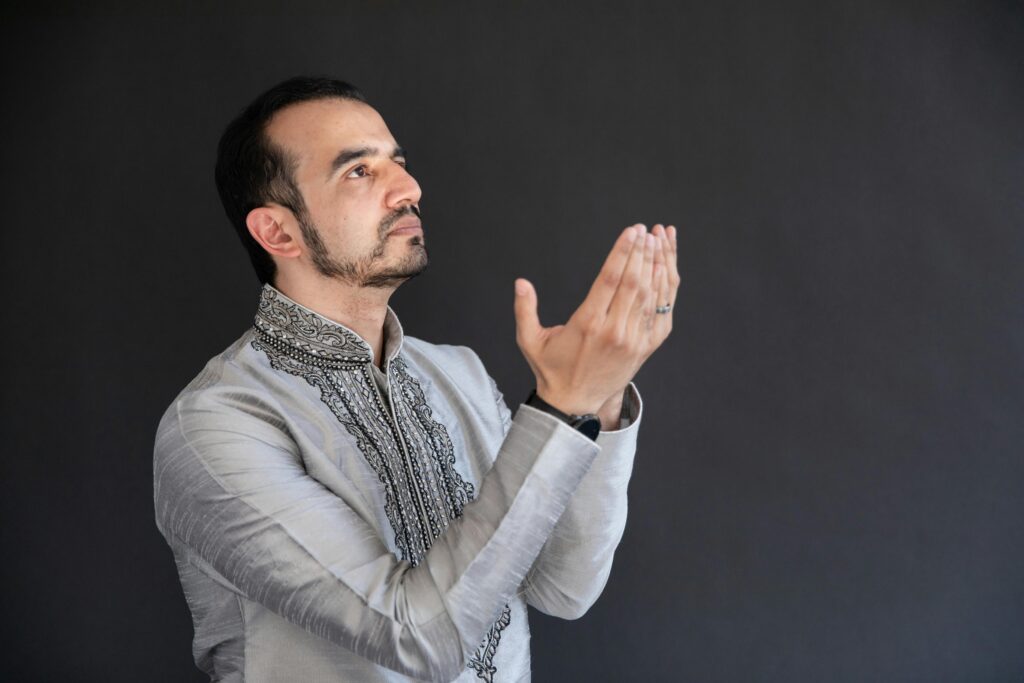Table of Contents
The Profound Essence of the 6 Kalimah in Islam
Islam, a religion of profound depth and spirituality, offers its followers guidance through various means, one of which includes the recitation and understanding of the 6 Kalimahs. These phrases, fundamental to Islamic faith, encapsulate the core beliefs and principles every Muslim is encouraged to live by. In this comprehensive exploration, we delve into each Kalimah, unveiling its significance, providing translations in English and Urdu, and offering a detailed explanation of its essence.

Kalimah Tayyibah: The Declaration of Faith
لَا إِلَٰهَ إِلَّا ٱللَّٰهُ مُحَمَّدٌ رَّسُولُ ٱللَّٰهِ
There is no deity but Allah, and Muhammad is the Messenger of Allah
کوئی معبود برحق نہیں مگر الله، اور محمد الله کے رسول ہیں۔
The Kalimah Tayyibah, the first of the six, is the declaration of faith, a testimony that affirms one’s belief in the oneness of Allah and the prophethood of Muhammad (PBUH). It marks the beginning of a Muslim’s spiritual journey, distinguishing them from non-believers and solidifying their commitment to Islam. This declaration is not just a statement but a profound belief that shapes a Muslim’s life, influencing their actions and decisions according to the teachings of Islam.
Kalimah Shahadah: The Testimony
أَشْهَدُ أَنْ لَا إِلَٰهَ إِلَّا ٱللَّٰهُ وَحْدَهُ لَا شَرِيكَ لَهُ وأَشْهَدُ أَنَّ مُحَمَّدًا عَبْدُهُ وَرَسُولُهُ
I bear witness that there is no deity but Allah, alone without partner, and I bear witness that Muhammad is His servant and Messenger.
میں گواہی دیتا ہوں کہ الله کے سوا کوئی معبود نہیں، وہ اکیلا ہے اس کا کوئی شریک نہیں، اور میں گواہی دیتا ہوں کہ محمد اس کے بندے اور رسول ہیں۔
The Kalimah Shahadah reinforces the message of the Kalimah Tayyibah, emphasizing the oneness of Allah and the finality of Prophet Muhammad’s (PBUH) prophethood. It serves as a foundation for all other beliefs and practices in Islam, guiding Muslims in their devotion to Allah and following the Prophet’s (PBUH) teachings.
Kalimah Tamjeed: Glorification of Allah
سُبْحَانَ ٱللَّٰهِ وَٱلْحَمْدُ لِلَّٰهِ وَلَا إِلَٰهَ إِلَّا ٱللَّٰهُ وَٱللَّٰهُ أَكْبَرُ وَلَا حَوْلَ وَلَا قُوَّةَ إِلَّا بِٱللَّٰهِ ٱلْعَلِيِّ ٱلْعَظِيمِ
Glory be to Allah, and praise be to Allah, and there is no deity but Allah, and Allah is the greatest. And there is no might nor power except with Allah, the Most High, the Great.
الله پاک ہے، اور تمام تعریفیں الله کے لئے ہیں، اور کوئی معبود برحق نہیں مگر الله، اور الله سب سے بڑا ہے، اور نہ کوئی قوت ہے نہ طاقت مگر الله کے ساتھ، جو بہت بلند اور عظیم ہے۔
Kalimah Tamjeed is a beautiful expression of glorification and praise towards Allah. It acknowledges Allah’s greatness, power, and sovereignty, reminding Muslims of their reliance on the Almighty for strength and support. This Kalimah fosters a sense of humility and gratitude among believers, encouraging them to always turn to Allah in every situation.
Kalimah Tawheed: Affirmation of God’s Oneness
لَا إِلَٰهَ إِلَّا ٱللَّٰهُ وَحْدَهُ لَا شَرِيكَ لَهُ، لَهُ ٱلْمُلْكُ وَلَهُ ٱلْحَمْدُ، يُحْيِي وَيُمِيتُ وَهُوَ حَيٌّ لَا يَمُوتُ أَبَدًا أَبَدًا، ذُو ٱلْجَلَالِ وَٱلْإِكْرَامِ بِيَدِهِ ٱلْخَيْرُ وَهُوَ عَلَىٰ كُلِّ شَيْءٍ قَدِيرٌ
There is no deity but Allah alone, He has no partner, to Him belongs the dominion and to Him belongs the praise, He gives life and causes death, and He is living and does not die, in His hand is good and He is over all things competent.
الله کے سوا کوئی معبود نہیں، وہ اکیلا ہے اس کا کوئی شریک نہیں، اسی کی بادشاہت ہے اور اسی کی تعریف ہے، وہی زندگی دیتا ہے اور موت دیتا ہے، اور وہ ہمیشہ زندہ ہے جو کبھی نہیں مرتا، اسی کے ہاتھ میں بھلائی ہے اور وہ ہر چیز پر قادر ہے۔
Kalimah Tawheed reinforces the concept of Allah’s oneness and his unparalleled attributes. It emphasizes Allah’s sovereignty, eternal life, and omnipotence, affirming the belief that all power and goodness rest with Him. This Kalimah serves as a reminder of Allah’s magnificence and encourages Muslims to trust in His wisdom and will.
Kalimah Astaghfar: Seeking Forgiveness
أَسْتَغْفِرُ ٱللَّٰهَ رَبِّي مِنْ كُلِّ ذَنْبٍ أَذْنَبْتُهُ عَمَدًا أَوْ خَطَأً سِرًّا أوْ عَلَانِيَةً وَأَتُوبُ إِلَيْهِ مِنَ ٱلذَّنْبِ ٱلَّذِي أَعْلَمُ وَمِنَ ٱلذَّنْبِ ٱلَّذِي لَا أَعْلَمُ، إِنَّكَ أَنْتَ عَلَّامُ ٱلْغُيُوبِ وَسَتَّارُ ٱلْعُيُوْبِ وَغَفَّارُ ٱلذُّنُوبِ وَلَا حَوْلَ وَلَا قُوَّةَ إِلَّا بِٱللَّٰهِ ٱلْعَلِيِّ ٱلْعَظِيمِ
I seek forgiveness from Allah, my Lord, from every sin I committed knowingly or unknowingly, secretly or openly, and I turn to Him from the sin I know and from the sin I do not know. Indeed, You are the Knower of the unseen and the Concealer of the faults and the Forgiver of the sins, and there is no might nor power except with Allah, the Most High, the Great.
میں اپنے رب الله سے ہر اس گناہ کی معافی طلب کرتا ہوں جو میں نے جان بوجھ کر یا بھول سے، چھپ کر یا کھلے عام کیا، اور میں اس گناہ کی طرف سے توبہ کرتا ہوں جسے میں جانتا ہوں اور اس گناہ سے جسے میں نہیں جانتا۔ بیشک، تو ہی غیب کا جاننے والا، عیبوں کو چھپانے والا اور گناہوں کو معاف کرنے والا ہے، اور نہ کوئی قوت ہے نہ طاقت مگر الله کے ساتھ، جو بہت بلند اور عظیم ہے۔
Kalimah Astaghfar is a powerful plea for Allah’s forgiveness, recognizing the human propensity to sin and the immense mercy of Allah. It encourages Muslims to constantly seek forgiveness for their known and unknown sins, reminding them of Allah’s attributes as the Concealer of faults and the Forgiver of sins. This Kalimah fosters a culture of repentance and humility within the Muslim community.
Kalimah Radd-e-Kufr: Disavowal of Disbelief
ٱللَّٰهُمَّ إِنِّي أَعُوذُ بِكَ مِنْ أَنْ أُشْرِكَ بِكَ شَيْءً وَأَنَا أَعْلَمُ بِهِ وَأَسْتَغْفِرُكَ لِمَا لَا أَعْلَمُ بِهِ تُبْتُ عَنْهُ وَتَبَرَّأَتُ مِنَ ٱلْكُفْر وَٱلشِّرْكِ وَٱلْكِذْبِ وَٱلْغِيبَةِ وَٱلْبِدْعَةِ وَٱلنَّمِيمَةِ وَٱلْفَوَاحِشِ وَٱلْبُهْتَانِ وَٱلْمَعَاصِي كُلِّهَا وَأَسْلَمْتُ وَأَقُولُ لَا إِلَٰهَ إِلَّا ٱللَّٰهُ مُحَمَّدٌ رَسُولُ ٱللَّٰهِ
O Allah, I seek refuge in You from knowingly associating anything with You, and I seek Your forgiveness for what I do not know. I repent from it, and I disavow disbelief, polytheism, lying, backbiting, innovation, slander, all forms of immorality, and disobedience, and I submit, and I say there is no deity but Allah, Muhammad is the Messenger of Allah.
اے الله، میں تیری پناہ میں آتا ہوں اس بات سے کہ تجھے جان بوجھ کر کسی چیز کے ساتھ شریک کروں، اور میں تیری معافی چاہتا ہوں اس بات کے لئے جو مجھے نہیں معلوم۔ میں اس سے توبہ کرتا ہوں، اور میں کفر، شرک، جھوٹ، غیبت، بدعت، تہمت، تمام قسم کے فحش کاموں اور نافرمانیوں سے بیزار ہوں، اور میں نے اسلام قبول کیا، اور میں کہتا ہوں کہ کوئی معبود برحق نہیں مگر الله، محمد الله کے رسول ہیں۔
Kalimah Radd-e-Kufr is a declaration of one’s complete disavowal of disbelief and commitment to the principles of Islam. It encompasses a Muslim’s rejection of all forms of polytheism, immorality, and disobedience to Allah. This Kalimah encourages believers to live a life of purity, integrity, and submission to Allah, reinforcing their faith and dedication to Islamic teachings.

How Halal Meat is Prepared: A Comprehensive Guide to Islamic Laws
FAQ Section
What are the 6 Kalimahs in Islam?
The 6 Kalimahs are essential declarations of faith in Islam, each serving a unique purpose in a Muslim’s spiritual life. They affirm the oneness of Allah, the prophethood of Muhammad (PBUH), seek forgiveness, glorify Allah, and renounce disbelief. These phrases are foundational to understanding and practicing Islam, guiding Muslims in their belief and daily conduct.
Why are the 6 Kalimahs important?
The 6 Kalimahs are crucial because they encapsulate the core beliefs of Islam. Reciting and understanding these Kalimahs help Muslims reinforce their faith, seek forgiveness, and maintain a constant reminder of Allah’s greatness and mercy. They are not only affirmations of faith but also serve as spiritual guidance and a source of strength and protection against disbelief.
How do the 6 Kalimahs impact a Muslim’s life?
The 6 Kalimahs have a profound impact on a Muslim’s life, shaping their beliefs, actions, and interactions with others. They foster a deep connection with Allah, encourage continuous reflection and repentance, and guide Muslims in leading a life aligned with Islamic principles. By internalizing these Kalimahs, Muslims strengthen their faith and cultivate virtues such as humility, gratitude, and patience.
Can non-Muslims benefit from understanding the 6 Kalimahs?
Yes, non-Muslims can benefit from understanding the 6 Kalimahs as they offer insights into the core beliefs and values of Islam. This understanding can foster interfaith dialogue, promote mutual respect, and dispel misconceptions about the religion. It provides a window into the spiritual depth of Islam and the emphasis it places on faith, morality, and the human connection with the divine.
How can one start learning and practicing the 6 Kalimahs?
To start learning and practicing the 6 Kalimahs, one can begin by studying their meanings and significance with the help of a knowledgeable teacher or reliable Islamic resources. Regular recitation and reflection on their implications for one’s life and conduct are crucial. Engaging in discussions with fellow Muslims and participating in community prayers can also enhance understanding and implementation of the teachings embodied in the 6 Kalimahs.

